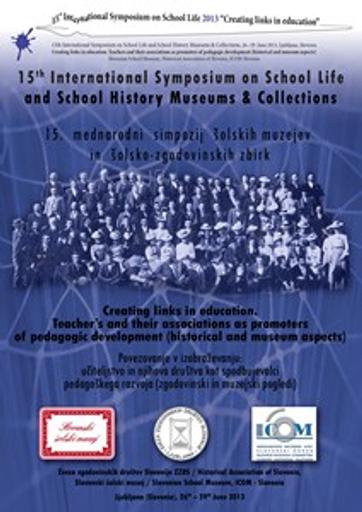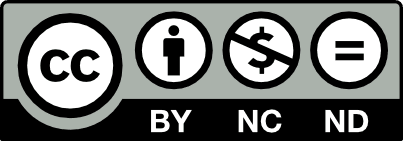/
Dogodki
/
Konference
Greece Museums of education as fields of cultural management. Comparative analysis in Greece

Avtor(ji):Maria Drakaki
Soavtor(ji):Branko Šuštar (mod.), Tina Palaić (drugo)
Leto:2013
Založnik(i):Slovenski šolski muzej, Ljubljana, Zveza zgodovinskih društev Slovenije, Ljubljana, ICOM Slovenija, Celje, Inštitut za novejšo zgodovino, Ljubljana
Vir(i):Session 2: Museums I
Jezik(i):angleščina
Vrst(e) gradiva:video
Avtorske pravice:

To delo avtorja Maria Drakaki je ponujeno pod Creative Commons Priznanje avtorstva-Nekomercialno-Brez predelav 4.0 Mednarodna
Datoteke (1)
Opis
The present paper is an attempt to map the thematic museums of education that exist in Greece, as well as to record the policies they follow and reveal their explanatory educational and social work. What is also attempted through this paper, is the comparative analysis of the educational –oriented museums that appear the last 20 years in Greece. The dialogue tries to show off the following aspects as crucial to their further constructive function: a) The rate of their correspondence to the demands of the modern role of the museum, based on the definition of the ICOM and the orders of for-life education b) the abilities and weaknesses that the museums themselves trace, in reference to their grounds and identity c) the rate of social sensitivity and their commitment to the development of co-operation among them. The conclusions of this paper summarize the characteristics of the museums that were responsive to this research and suggest a model of systemic approach. This model will subject the museums to strategic planning according to unified principles of cultural management and will define specific roles and areas of research, as well as possible specialization in theoretical sections of education, determining standards of control and certification by a scientific and administrative authority. It is important to emphasize that this model is going to provide degrees of freedom that will highlight the needs and interests of the local society, where these museums belong to, setting as a goal the strength of the development of necessary initiatives. What is strongly suggested is the creation of a network that will perform cultural politics according to high-standard specifications based on the sciences of cultural management and education. This cultural politics will derive from the centre that will provide the necessary means but will be adapted and accomplished only with the help and co-operation of the local societies
Metapodatki (12)
- identifikatorhttps://hdl.handle.net/11686/37647
- naslov
- Greece Museums of education as fields of cultural management. Comparative analysis in Greece
- Τα Μουσεία Εκπαίδευσης ως πεδία πολιτιστικής διαχείρισης. Συγκριτική ανάλυση στον ελλαδικό χώρο
- ustvarjalec
- Maria Drakaki
- soavtor
- Branko Šuštar (mod.)
- Tina Palaić (drugo)
- predmet
- zgodovina
- šolstvo
- muzej
- history
- school system
- museum
- opis
- The present paper is an attempt to map the thematic museums of education that exist in Greece, as well as to record the policies they follow and reveal their explanatory educational and social work. What is also attempted through this paper, is the comparative analysis of the educational –oriented museums that appear the last 20 years in Greece. The dialogue tries to show off the following aspects as crucial to their further constructive function: a) The rate of their correspondence to the demands of the modern role of the museum, based on the definition of the ICOM and the orders of for-life education b) the abilities and weaknesses that the museums themselves trace, in reference to their grounds and identity c) the rate of social sensitivity and their commitment to the development of co-operation among them. The conclusions of this paper summarize the characteristics of the museums that were responsive to this research and suggest a model of systemic approach. This model will subject the museums to strategic planning according to unified principles of cultural management and will define specific roles and areas of research, as well as possible specialization in theoretical sections of education, determining standards of control and certification by a scientific and administrative authority. It is important to emphasize that this model is going to provide degrees of freedom that will highlight the needs and interests of the local society, where these museums belong to, setting as a goal the strength of the development of necessary initiatives. What is strongly suggested is the creation of a network that will perform cultural politics according to high-standard specifications based on the sciences of cultural management and education. This cultural politics will derive from the centre that will provide the necessary means but will be adapted and accomplished only with the help and co-operation of the local societies
- Η παρούσα εργασία αποτελεί μια προσπάθεια για χαρτογράφηση των θεματικών μουσείων εκπαίδευσης που λειτουργούν στον ελλαδικό χώρο, για καταγραφή των πολιτικών και των πρακτικών που ακολουθούν και για ανάδειξη του ερμηνευτικού, εκπαιδευτικού και κοινωνικού τους έργου. Επιχειρείται η συγκριτική ανάλυση των μουσείων εκείνων που εμφανίζονται στον ελλαδικό χώρο τα τελευταία 20 έτη με αμιγώς θεματικό προσανατολισμό την εκπαίδευση. Ο διάλογος επιχειρεί να αναδείξει τις ακόλουθες πτυχές ως πολύ βασικές για την περαιτέρω εποικοδομητική λειτουργία τους: α)Το βαθμό ανταπόκρισής τους στις απαιτήσεις του σύγχρονου ρόλου του Μουσείου με βάση τον ορισμό του ICOM και με βάση το πρόσταγμα της δια βίου εκπαίδευσης β)τις δυνατότητες και τις αδυναμίες που τα ίδια εντοπίζουν σε σχέση με την υπόσταση και την ταυτότητά τους γ)το βαθμό της κοινωνικής ευαισθητοποίησης και δέσμευσής τους για την ανάπτυξη συνεργασιών μεταξύ τους. Στα συμπεράσματα συνοψίζονται τα χαρακτηριστικά των Μουσείων που ανταποκρίθηκαν στην έρευνα και προτείνεται ένα μοντέλο συστημικής προσέγγισής τους που θα τα υποβάλλει σε στρατηγικό σχεδιασμό με ενιαίες αρχές πολιτιστικής διαχείρισης , θα προσδιορίζει διακριτούς ρόλους και πεδία έρευνας, πιθανή εξειδίκευση σε θεωρητικούς τομείς της εκπαίδευσης ορίζοντας βαθμούς ελέγχου και πιστοποίησης από μια διεπιστημονική διαχειριστική αρχή. Πάντα όμως παρέχοντας βαθμούς ελευθερίας που θα αναδεικνύουν τις ανάγκες και τα ενδιαφέροντα της τοπικής κοινωνίας από την οποία προέρχονται τα μουσεία αυτά και με στόχο να ενδυναμώνεται η ανάπτυξη των αναγκαίων πρωτοβουλιών .Προτείνεται δηλαδή η δημιουργία ενός δικτύου που θα ασκεί πολιτιστική πολιτική με προδιαγραφές υψηλού επιπέδου βασισμένες στις επιστήμες της πολιτιστικής διαχείρισης και των επιστημών της αγωγής, η οποία θα εκπορεύεται από το κέντρο που θα διαθέτει τα μέσα , αλλά θα προσαρμόζεται και θα καρποφορεί μόνο με τη συνεργασία των τοπικών κοινωνιών.
- založnik
- Slovenski šolski muzej
- Zveza zgodovinskih društev Slovenije
- ICOM Slovenija
- Inštitut za novejšo zgodovino
- datum
- 2013
- 26. 06. 2013
- tip
- video
- jezik
- Angleščina
- jeDelOd
- pravice
- licenca: ccByNcNd
